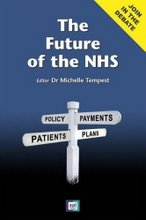
This chapter is a summary of Chapter 9 - The future of geriatric medicine. It was written by ,Professor Peter Crome, Professor of Geriatric Medicine and Deputy Head of Keele University Medical School as well as President-Elect, British Geriatrics Society. He is a Consultant Geriatrician with a special interest in the evaluation of health services for older people and the treatment of common disorders of later life, including stroke and dementia
In this chapter Professor Crome discusses the impact of the increase in life expectancy that has been a triumph for humankind, but brings with it great challenges for the NHS.
He explains the benefits of the key standards in the National Service Framework for Older People (NSFOP) but warns against a “tick-box” approach to the improvement of services. He tackles the difficult questions such as, residential and nursing homes, rehabilitation and chronic disease management and warns of the paucity of information about the effectiveness of medications for common conditions in those aged 80 and over.
Optimising the health of older people is no small task and requires investment and co-ordination at all levels. He suggests requirements over the next decade:
· greater emphasis on health promotion by education
· greater involvement of older people themselves in health decisions
· suggests developing tailored therapeutic elderly services to tackle the growing problems of the misuse of drugs and alcohol within this age group
· proposes developing GPs with a Specialist Interest in elderly care
· highlights the need to treat older patients as individual people, to respect their rights, opinions and feelings and to treat them with dignity and humanity however ill and seemingly incapacitated.
In this chapter Professor Crome discusses the impact of the increase in life expectancy that has been a triumph for humankind, but brings with it great challenges for the NHS.
He explains the benefits of the key standards in the National Service Framework for Older People (NSFOP) but warns against a “tick-box” approach to the improvement of services. He tackles the difficult questions such as, residential and nursing homes, rehabilitation and chronic disease management and warns of the paucity of information about the effectiveness of medications for common conditions in those aged 80 and over.
Optimising the health of older people is no small task and requires investment and co-ordination at all levels. He suggests requirements over the next decade:
· greater emphasis on health promotion by education
· greater involvement of older people themselves in health decisions
· suggests developing tailored therapeutic elderly services to tackle the growing problems of the misuse of drugs and alcohol within this age group
· proposes developing GPs with a Specialist Interest in elderly care
· highlights the need to treat older patients as individual people, to respect their rights, opinions and feelings and to treat them with dignity and humanity however ill and seemingly incapacitated.
To comment on this chapter, please post a comment here and/or on the discussion forum at www.thefutureofthenhs.com




No comments:
Post a Comment